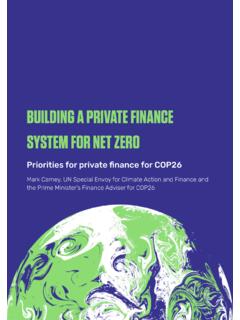Transcription of The Ocean as a Solution to Climate Change
1 Ocean as a Solution to Climate ChangeFive opportunities for ActionCONVENING LEAD AUTHOR Ove Hoegh-Guldberg EXPERT AUTHORS: Ken Caldeira, Thierry Chopin, Steve Gaines, Peter Haugan, Mark Hemer, Jennifer Howard, Manaswita Konar, Dorte Krause-Jensen, Elizabeth Lindstad, Catherine E. Lovelock, Mark Michelin, Finn Gunnar Nielsen, Eliza Northrop, Robert Parker, Joyashree Roy, Tristan Smith, Shreya Some, and Peter TyedmersCommissioned byAbout this PaperEstablished in September 2018, the High Level Panel for a Sustainable Ocean Economy (HLP) is a unique initiative of 14 serving heads of government committed to catalysing bold, pragmatic solutions for Ocean health and wealth that support the Sustainable Development Goals (SDGs) and build a better future for people and the planet. By working with governments, experts and stakeholders from around the world, the High Level Panel aims to develop a roadmap for rapidly transitioning to a sustainable Ocean economy, and to trigger, amplify and accelerate responsive action worldwide.
2 The Panel consists of the presidents or prime ministers of Australia, Canada, Chile, Fiji, Ghana, Indonesia, Jamaica, Japan, Kenya, Mexico, Namibia, Norway, Palau and Portugal, and is supported by an Expert Group, Advisory Network and Secretariat that assist with analytical work, communications and stakeholder engagement. The Secretariat is based at World Resources report was prepared in support of the work of the HLP to provide the robust science base and practical recommendations for action across issues central to the attainment of a sustainable Ocean economy. The arguments, findings, and recommendations made in this report represent the views of the authors. While the HLP supports the general thrust of the findings and recommendations, members have not been asked to formally endorse the report, and should not be taken as having done Citation: Hoegh-Guldberg.
3 O., et al. 2019. The Ocean as a Solution to Climate Change : Five Opportu-nities for Action. Report. Washington, DC: World Resources Institute. Available online of ContentsForeword ..1 Executive Summary ..3 Introduction ..19 Ocean -based Renewable Energy ..27 Ocean -based Transport ..37 Coastal and Marine Ecosystems ..47 Fisheries, Aquaculture, and Shifting Diets ..59 Carbon Storage in the Seabed ..69 Wider Impacts of Ocean -based Actions ..77 Conclusion ..89 Glossary ..94 References ..96 Acknowledgements ..110 About the Authors ..111 Foreword1 The Ocean as a Solution to Climate Change : Five opportunities for Action |FOREWORDThe Ocean : From Victim to SolutionConcerned about the accelerating impacts of Climate Change , cognizant of the paucity of attention to Ocean -based mitigation options, and motivated to accelerate progress to address Climate Change , the High Level Panel for a Sustainable Ocean Economy (HLP) asked us, the co-chairs of the HLP Expert Group, to convene an international team of scientists and other experts to evaluate the potential for Ocean -based actions to contribute to reducing greenhouse gas (GHG) Previous and recent reports describe the important role of the Ocean in Climate Change including its uptake of heat and CO2 and the serious consequences of Climate Change on Ocean ecosystems.
4 The most recent Intergovernmental Panel on Climate Change (IPCC) report, the Special Report on the Ocean and Cryosphere in a Changing Climate , highlights the dire impacts on the Ocean that are already underway and provides a sense of even greater urgency to reduce GHG emissions aggressively. This HLP report provides a timely pivot from problem to a significant missing piece of the Solution . Heretofore, Climate mitigation policy has concentrated intensively on land-based mitigation activities. The HLP report offers the first comprehensive, integrated assessment of the mitigation potential of a suite of Ocean -based activities: renewable energy, transport, food production, and ecosystems, and the potential future contribution from carbon storage if current concerns can be resolved. Each of these five areas is assessed for its potential to close the emissions gap in 2030 and 2050 relative to a C degree and 2 C degree pathway.
5 Moreover, each activity is also evaluated for its wider benefits to society (beyond mitigation). Finally, the report highlights the enabling policy measures and research required for success. As co-chairs of the HLP Expert Group, we wish to warmly thank the authors, the reviewers, and the Secretariat at World Resources Institute for responding rapidly and effectively to the opportunity to conduct novel analyses, hold them up to scrutiny through peer review, and hopefully accelerate serious reductions of GHG emissions. With this report, we launch the first in a series of products of the HLP Expert Group that are responsive to the interests of the members of the HLP and designed to provide actionable analyses, syntheses, and recommendations for consideration by the HLP and other interested parties. Our goal is to deliver timely scientific analysis that responds directly to policy requests and societal needs.
6 We also thank the members of the HLP for their vision in suggesting this analysis. We hope they and other parties act on the report s information with an urgency that is commensurate with the seriousness of the problem. Forward-looking policies that both combat Climate Change and enable a sustainable Ocean economy are feasible and needed without Jane Lubchenco, Oregon State University Professor Peter Haugan, Institute of Marine Research, Norway Hon. Mari Elka Pangestu, University of Indonesia 1. This study was undertaken by the co-chairs of the HLP Expert Group, ably assisted by the Secretariat, at the request of the Members of the HLP. On behalf of the co-chairs, J. Lubchenco served as the report arbiter, overseeing the selection of authors, independent peer review, and approval of the final report.
7 Co-chair P. Haugan, co-author and contributor to the report, was not involved in the arbitration The Ocean as a Solution to Climate Change : Five opportunities for Action |Executive Summary The Ocean is a dominant feature of our planet, covering 70 percent of its surface and driving its Climate and biosphere. The Ocean sustains life on earth and yet is in peril from Climate Change . However, while much of recent attention is focused on the problems that the Ocean faces, the Ocean is also a source of potential solutions and innovation. This report explores how the Ocean , its coastal regions and economic activities can provide opportunities in the fight against Climate | High Level Panel for a Sustainable Ocean EconomyHighlights Until recently, the Ocean was thought to be so large that its response to Climate Change was thought to be minimal; it has now taken centre stage in the impacts and solutions .
8 Ocean -based mitigation options to reduce or sequester and store emissions offer significant potential to contribute to global efforts to limit global warming and for achieving the goals of the Paris Agreement. Ocean -based mitigation options could reduce global greenhouse gas (GHG) emissions by nearly 4 billion tonnes of carbon dioxide equivalent (CO2e) per annum in 2030 and by more than 11 billion tonnes per annum in 2050, relative to projected business-as-usual (BAU) emissions. Reductions of this magnitude are larger than the emissions from all current coal fired power plants world-wide and more than China s total emissions in 2014. Ocean -based mitigation options could reduce the emissions gap (the difference between emissions expected if current trends and policies continue and emissions consistent with limiting global temperature increase) by up to 21 percent on a C pathway, and by about 25 percent on a C pathway, by 2050.
9 This report considers five areas of Ocean -based Climate action to mitigate GHG emissions: Ocean -based renewable energy; Ocean -based transport; coastal and marine ecosystems; the Ocean -based food system (wild capture fisheries, aquaculture, and shifting human diets towards food from the sea); and carbon storage in the seabed. Ocean -based renewable energy production currently offers the greatest potential for delivering clean energy and reducing GHG emissions, with the expansion of floating wind and solar facilities being exciting frontiers. When wider impacts on the environment and social well-being are considered, nature-based interventions especially protection and restoration of mangroves, seagrass and salt marshes offer the best combination of carbon mitigation and broader cobenefits. While innovation is required to improve many specific technologies and practices, four of the Ocean -based Climate action areas are ready to be implemented today ( Ocean -based renewable energy; Ocean -based transport; coastal and marine ecosystems; the Ocean -based food system).
10 This could offer many cobenefits in terms of creating jobs, improving air quality and human health, and supporting livelihoods if implementation addresses trade-offs with sustainable development dimensions appropriately. The fifth, carbon storage in the seabed, has significant theoretical potential to divert carbon from the atmosphere, but it currently faces significant technical, economic, and sociopolitical challenges ( , environmental safety) that must be adequately explored prior to deployment at the scale required to make a substantive contribution to solving the Climate problem. Ocean -based mitigation options must be accompanied by deep cuts in emissions across terrestrial GHG sources, including measures to phase out fossil fuels, create sustainable food systems, and increase carbon sequestration and storage in forests and other natural ecosystems.



